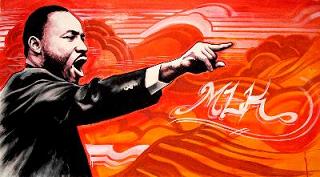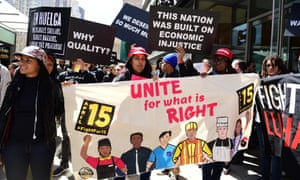Martin Luther King: The Struggle for a Living Wage and the End to War
Nearly a half-century later the United States has continued to exploit the workers and the oppressed

April 4, 2017 marked the 49th anniversary since the martyrdom of Dr. Martin Luther King, Jr., the 20th century’s most outstanding proponent of Civil Rights and Peace to emerge in the United States.
This year the cause of low-wage workers took center stage as fast food, senior homes and child care employees demonstrated across the country demanding a $15 an hour minimum wage.
In Detroit, hundreds of these workers marched into the Michigan State Office Bldg. in Cadillac Place calling for Republican Governor Rick Snyder to support a hike in the minimum wage to $15. After being confronted by the State police the crowd of most youthful workers moved outside for a rally.
These actions are largely supported by the Service Employees International Union (SEIU), one of the fastest growing labor organizations in the country. Over the last several years, SEIU has taken up the demand by these workers for a living wage.
Although the last two monthly reports from the Bureau of Labor Statistics claim that in excess of 200,000 jobs have
been created, what is not being said is in what sectors and how much are these workers being paid. Poverty is increasing overall in the U.S. A majority of people feel as if they are sinking more into economic uncertainty. Moreover, the Labor Participation Rate is the still hovering around 62 percent of the overall workforce.
Nonetheless, the new administration of President Donald Trump has failed to even acknowledge the actual plight of low-wage workers. Trump has staffed his administration with Wall Street bankers, Pentagon generals and ideological racists.
His own personal history is one of racial discrimination and gentrification directed against African Americans and Latinos. He has targeted people from several African and Middle Eastern countries under the guise of fighting terrorism while continuing the already existing siege against immigrants from Mexico and other Central and South American states.
Outside Cadillac Place in Detroit, beginning exactly at 5:00pm, there was a moment of silence in honor of Dr. King who was gunned down in Memphis just after 6:00pm Central time on April 4, 1968. This was replicated throughout the cities where there were demonstrations for a hike in the minimum wage.
According to a statement issued by Fight for $15 organizer Latierika Blair from Memphis:
“Today was HUGE. Thousands with the Fight for $15 and Movement for Black Lives took over the streets in cities across the nation. We are still fighting for that dream – of economic and racial justice. And we carried the fight through the streets of Memphis to the very spot where Dr. King was killed while standing with striking sanitation workers.”
Blair reported that demonstrators had occupied the mayor’s office in San Diego. Also Fast-food cooks and cashiers in Virginia and North Carolina sported MLK buttons to their places of employment in solidarity with Fight for $15 actions in Virginia. In Los Angeles, a McDonald’s restaurant was forced to close amid massive protests outside.
King’s Last Years and the Struggle against Poverty, Racism and War
What is routinely overlooked by the corporate and government-sponsored media in the U.S. is the political shift of Dr. King and the Southern Christian Leadership Conference (SCLC) following the signing of the Voting Rights Act on August 6, 1965. Just five days later on August 11, the African American masses in Los Angeles rose up in rebellion for six days fighting against the horrendous aspects of police repression, economic marginalization, super-exploitation and national oppression.
The so-called “Watts Riot” of August 1965 was in fact a logical response to the failure of the then administration of President Lyndon B. Johnson, who despite his signing of the Civil Rights Act of 1964 and the Voting Rights Bill the following year, the fundamental economic transformative demands related to income redistribution and the elimination of national oppression was never implemented.
That same year, 1965, witnessed the escalation of the U.S. imperialist war in Vietnam. Hundreds of thousands of Pentagon troops were deployed to this Southeast Asian nation in an effort to halt the forward movement towards unification and Socialism. The war was framed as a necessity to halt the advances of Communism in the region yet the whole concept of bourgeois democracy in the U.S. proved to be farcical in light of the uprising in Los Angeles.
 Dr. King knew that he could no longer ignore the socio-economic plight of the African American and other oppressed nations living in both the urban and rural areas of the U.S. In early 1966, Dr. King relocated to Chicago where he joined the Freedom Movement to demand quality housing, the eradication of slums, jobs and an end to police brutality.
Dr. King knew that he could no longer ignore the socio-economic plight of the African American and other oppressed nations living in both the urban and rural areas of the U.S. In early 1966, Dr. King relocated to Chicago where he joined the Freedom Movement to demand quality housing, the eradication of slums, jobs and an end to police brutality.
Soon enough in July 1966 after the city administration of Mayor Richard Daley dismissed the legitimate demands of the Chicago Freedom Movement the African American masses also rebelled in that city. These rebellions spread to approximately 40 cities that summer.
In January 1966, the Student Nonviolent Coordinating Committee (SNCC) issued a firm statement in opposition to the war in Vietnam. SNCC pointed out the hypocrisy of the Johnson administration which could not guarantee democracy in Mississippi, Alabama and other areas of the U.S. where African Americans resided in large numbers. If they could not ensure self-determination and full equality for oppressed peoples in the U.S. it would be beyond the capacity of this same government to have good intentions in Southeast Asia.
Consequently, during the early months of 1967, Dr. King formulated his views in opposition to the war in Vietnam as being symptomatic of the deeper malady of institutional racism and hegemonic foreign policy. On April 4, 1967, Dr. King gave an historic address at Riverside Church in New York City calling for a unilateral halt to the imperialist aggression in Vietnam. His position further intensified the administration and intelligence apparatus’ enmity against his work.
By 1967, urban rebellions erupted in cities such as Newark, Cincinnati, Milwaukee, with the largest of all uprisings taking place in Detroit in late July. This year represents the 50th anniversary of the Detroit Rebellion and already the corporate media is distorting the history of the African American struggle in the city in an effort to criminalize the heroic legacy of resistance to national oppression, economic exploitation and state repression.
Therefore, the intervention of Dr. King in Memphis was a logical outcome of the developing liberation movement of the African American people. The efforts to end the war in Vietnam intersected with the aspiration for total freedom of the Black masses in the U.S. and around the globe.
Capitalist Crises and National Oppression Escalates

The ascendancy of the administration of Trump is a reflection of the failures of capitalism and imperialism in the contemporary period. Trump is threatening war against the Democratic People’s Republic of Korea (DPRK), the Syrian Arab Republic, Islamic Republic of Iran, Bolivarian Republic of Venezuela, etc., and in doing such is risking direct military conflict with the Russian Federation and the People’s Republic of China.
On the economic front a new round of corporate bankruptcies and massive lay-offs are occurring in the retail sector of the U.S. economy. These developments will render tens of thousands of people jobless not to mention the peripheral impact of store closings, chapter 11 bankruptcy filings along with inevitable home foreclosures and evictions.
Just in 2017, the following stores have announced major job cuts:
“American Apparel – all 110; CVS – closing 70 stores; Chico – closing 120 stores; Crocs – closing 160 stores; Family Christian – closing all of its 240 stores; JCPenney – closing 138 stores; Kmart – closing 108 stores; Macy’s – closing 63 stores; Office Depot – closing 100 stores; Payless Shoes – closing 400-500 stores Radio Shack – closing 552 stores; Sears – closing 42 stores; The Limited – closed 250 stores in January; The Children’s Place – closing as many as 200 stores; and H.H. Gregg – closing 88 stores.” (AJC, March 24)
Therefore, the vision and legacy of Dr. King is very much alive from the standpoint of the need to mobilize and organize the working people and nationally oppressed in the U.S. The capitalist system is tightening its grip on the majority of the population both domestically and internationally. Only an internationalist approach to the problem can result in victory over these intractable adversaries.

